
A GUIDE TO
VOTING IN
MISSISSIPPI
WHEN IN
PRISON
Help Assistance and Attachments
Step 5 Complete Your Absentee Ballot
Step 4
Complete Your Absentee Ballot Application
Step 3 Request Your Absentee Ballot Application
Step 2 Register to Vote
Step 1
Are You Eligible to Vote?
9/29/20A Guide to Voting in Mississippi When in Prison (v21) Rev.2 1

THE PURPOSE OF THIS GUIDE
1. Determine if you are eligible to vote.
If so, continue. If not, stop here.
2. Mail your Voter Registration Form
(to add you to the voter rolls)
Mail anytime, but to vote in an upcoming election, it must be postmarked at least 30 days
before that election.
à
Your Circuit Clerk then mails you your Voter Registration Card (if not, still continue).
3. Mail your letter requesting an Absentee Ballot Application
These requests can be mailed beginning 60 days before that election.
à Your Circuit Clerk then mails you an Absentee Ballot Application.
4. Mail your Absentee Ballot Application
These applications can be mailed beginning 45 days before that election.
à Your Circuit Clerk then mails you an Absentee Ballot
5. Mail your Absentee Ballot
These ballots can be mailed anytime after receipt but must be postmarked by election day
and received by 5 business days after the election.
à Your Circuit Clerk then process your ballot and your vote should count
•
Mississippi Center for Justice
•
Southern Poverty Law Center
•
Mississippi Votes
If you’re an eligible voter and encounter difficulties voting in prison
or jail, you should
immediately contact your County Circuit Clerk
and the Mississippi Secretary of State
via the Secretary’s Elections
Answerline (1-800-829-6786); office (601-576-2550); or by mail
(401 Mississippi St., Jackson, MS 39205).
If you try to contact your county and state officials and are still
having trouble voting, we can be reached at 601-709-2139 (M/W/F,
2-6 pm)
.
Hello!
Eligible voters in prison and jail in Mississippi have the legal right to
vote absentee by mail-in ballot. This guide is to help eligible voters
incarcerated in Mississippi register to vote and vote—a five step
process.
In Step 1, you determine if you are eligible to vote in Mississippi. If
you are, in Steps 2, 3, 4, and 5, you mail documents to your Circuit
Clerk to apply to vote absentee and to vote by absentee ballot.
Then you’re done! The next time you vote, you’ll already be
registered, so you just need to do Steps 3, 4, and 5.
THE 5 STEPS TO VOTING
GETTING HELP
9/29/20A Guide to Voting in Mississippi When in Prison (v21) Rev.2 2
•
OneVoice
•
RECH Foundation
•
MPRC
•
J.B. Fndn / T.O.P.S. of MS
•
People in prison and their
loved ones on the outside
CREATED BY:
IN PARTNERSHIP WITH:

Help
If you had trouble voting, you contacted or tried to contact your County Circuit Clerk and/or the
Secretary of State’s Office (see p.2 for contact information) on ____________ (date).
Step 5
You received your Absentee Ballot from your Circuit Clerk on ____________ (date).
You signed & mailed your Absentee Ballot to your Circuit Clerk on _________ (date).
Step 4
You received your Absentee Ballot Application from your Circuit Clerk on ____________ (date).
You signed & mailed your Absentee Ballot Application to your Circuit Clerk on _________ (date).
Step 3
You signed & mailed your letter requesting an Absentee Ballot Application to your Circuit Clerk
on ________ (date).
Step 2
You signed & mailed your Voter Registration Form to your Circuit Clerk on ____________ (date).
You received your Voter Registration Card from your Circuit Clerk on ____________ (date).
Step 1
You reviewed the four eligibility criteria and determined you are eligible to vote.
YOUR DATE
TRACKING
WORKSHEET:
FILL OUT
& KEEP
FOR YOUR
RECORDS
9/29/20A Guide to Voting in Mississippi When in Prison (v21) Rev.2 3
or MS Votes

STEP 1:
ARE YOU
ELIGIBLE
TO VOTE
1. You are a U.S. citizen and will be at least 18 years old by the date of the next
election.
2. You have not been declared mentally incompetent by a court.
3. You have never been convicted in a Mississippi state court of any of
Mississippi’s 22 “disenfranchising” offenses, listed in the pages that follow.
4. Before incarceration, you were a resident of Mississippi and of a county, city,
or town (your “residence”) for at least 30 days.
It’s a felony to register to vote or vote if one is ineligible due to conviction of a “disenfranchising” offense.
VOTER ELIGIBILITY CRITERIA:
YOU CAN VOTE IF ALL FOUR STATEMENTS ARE TRUE FOR YOU
When in Jail/Prison, Use These As Locations On All Voting Materials:
Your County Circuit Clerk
Your “residence” = where you lived prior to incarceration
Your “physical address” (not prison/jail)
Your “mailing address”
Your return mailing = your current jail/prison
address
9/29/20A Guide to Voting in Mississippi When in Prison (v21) Rev.2 4

f
MORE INFO ON
STEP 1:
ARE YOU
ELIGIBLE TO
VOTE
1. vote fraud
2. armed robbery
3. arson
4. bad check (felony)
5. bigamy
6. bribery
7. carjacking
8. embezzlement (felony)
9. extortion
10. forgery
11. Larceny
12. murder
13. obtaining money or goods
under false pretense
14. perjury
15. rape
16. receiving stolen property
17. robbery
18. shoplifting (felony)
19. statutory rape
20. theft (felony)
21. timber larceny
22. unlawful taking of a vehicle
MISSISSIPPI’S 22 DISENFRANCHISING CRIMES
THAT TAKE AWAY YOUR RIGHT TO VOTE FOR LIFE IN MISSISSIPPI
See the next page for a list of certain criminal code sections included in these 22
disenfranchising offenses, grouped by offense.
See Attachment A for the same list in order of criminal code section number.
All dispositions which would count as a conviction for one of these crimes are disenfranchising.
9/29/20A Guide to Voting in Mississippi When in Prison (v21) Rev.2 5
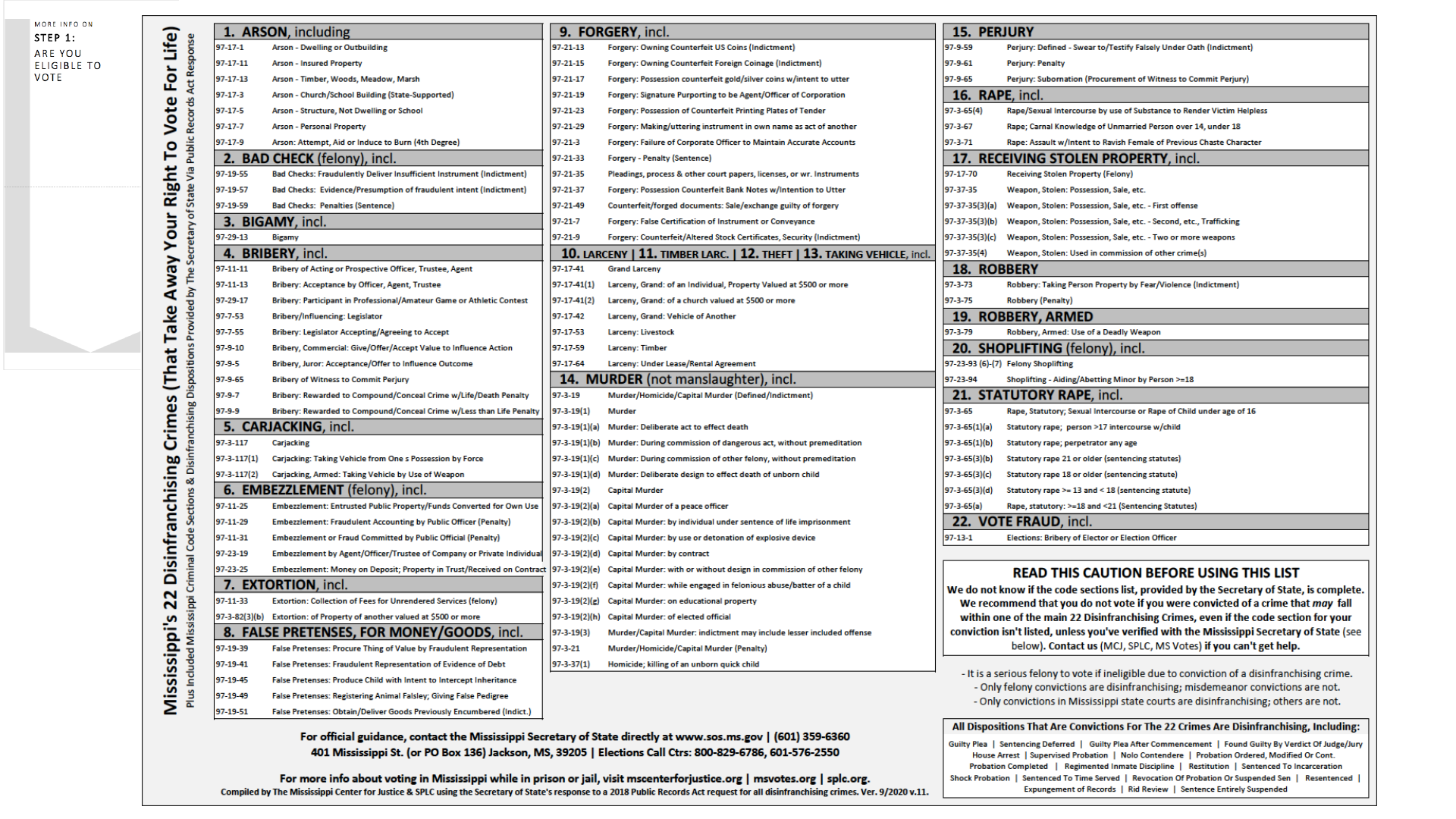
9/29/20A Guide to Voting in Mississippi When in Prison (v21) Rev.2 6

Unfortunately, if you have ever been convicted of any of the 22 crimes
on the previous page, even if you’ve completed your sentence, you
are not eligible to vote in Mississippi. It’s a serious felony to vote if not
eligible. Please note that previously incarcerated Mississippians are
currently challenging Mississippi’s disenfranchisement laws in court.
Stop here if you do not satisfy
all four eligibility criteria.
If you satisfy all four eligibility criteria (and have never been convicted
of a disenfranchising crime), continue to Step 2 to register to vote!
f
MORE INFO ON
STEP 1:
ARE YOU
ELIGIBLE TO
VOTE
9/29/20A Guide to Voting in Mississippi When in Prison (v21) Rev.2 7

Mail it anytime, but to
vote in an upcoming
election, it must be
postmarked at least 30
days before that
election. (Post it by
Oct. 5 for the
11/3/2020 election)
.
VOTER REGISTRATION FORM
(SEE ATTACHMENT E FOR A BLANK FORM YOU CAN USE)
1. Complete the form. No copy of an ID is needed if you use the last four digits
of your social security number or driver’s license number.
2. You sign it.
3. Write “voting mail” on the envelope and mail it to your Circuit Clerk.***
STEP 2:
REGISTER
TO VOTE
Make a note of the
date you mailed it out.
When Voting from Prison or Jail,
Complete Forms Using the Following Locations For All Voting Materials:
Your County Circuit Clerk
Your “residence” =the place you lived before incarceration
Your “physical address” (not a prison or jail address)
Your “mailing address” =your current prison or jail address
(where you’ll receive voting mail)
9/29/20A Guide to Voting in Mississippi When in Prison (v21) Rev.2 8
***
OPTIONAL: The non-profit MS Votes will forward the completed Voter Registration Form of any
incarcerated person to their Circuit Clerk by U.S. Postal Certified Mail or hand delivery. If have at least 15 extra
days to spare before the registration deadline (not including the time needed for MS Votes to receive your
form), then you may choose to mail your Form to MS Votes, 510 George Street, Suite 308, Jackson, MS 39202.

You should receive a Voter Registration Card from your County Circuit Clerk after
mailing your Voter Registration Form.
OPTIONAL:
TRY TO VERIFY YOUR REGISTRATION IF YOU DON’T
RECEIVE YOUR VOTER REGISTRATION CARD
DO NOT DELAY CONTINUING TO STEP 3
If you mailed in your voter registration form and haven’t received
Voter Registration Cards, you can still CONTINUE ON TO STEP 3.
f
MORE INFO ON
STEP 2:
REGISTER TO
VOTE
9/29/20A Guide to Voting in Mississippi When in Prison (v21) Rev.2 9
Ways to check if you’re registered to vote if you haven’t received your voter registration card yet:
1. Ask someone you trust to verify you are registered by visiting www.yallvote.sos.ms.gov. (It will
require you give them the last four digits of your SSN and your date of birth.)
2. Your or someone you trust can call your County Circuit Clerk to ask if you’re registered to vote.
See
Attachment C
for a list of their phone numbers.
3. We can be reached at 601-709-2139 (M/W/F, 2-6 pm).

Mail your request
within
60 days of the
election
you want to
vote in.
(That’s after
Sept. 4 for the
11/3/2020 election.)
Make a note of the
date you mailed it out.
STEP 3:
REQUEST AN
ABSENTEE
BALLOT
APPLICATION
AFTER YOU’RE REGISTERED TO VOTE, REQUEST AN
ABSENTEE BALLOT FROM YOUR CIRCUIT CLERK
Beginning 60 days before an election you want to vote in, you must ask your Circuit
Clerk (in the county where you lived before incarceration) to mail you an Absentee
Ballot Application at your current facility mailing address.
You can ask:
(a) by phone (see
Attachment C
for Circuit Clerk phone numbers), or
(b) by letter (
see the next page for a fill-in-the-blank letter you can send
).
1. Sign any request letter.
2. Write “voting mail” on the envelope and mail it to your Circuit Clerk.
9/29/20A Guide to Voting in Mississippi When in Prison (v21) Rev.2 10
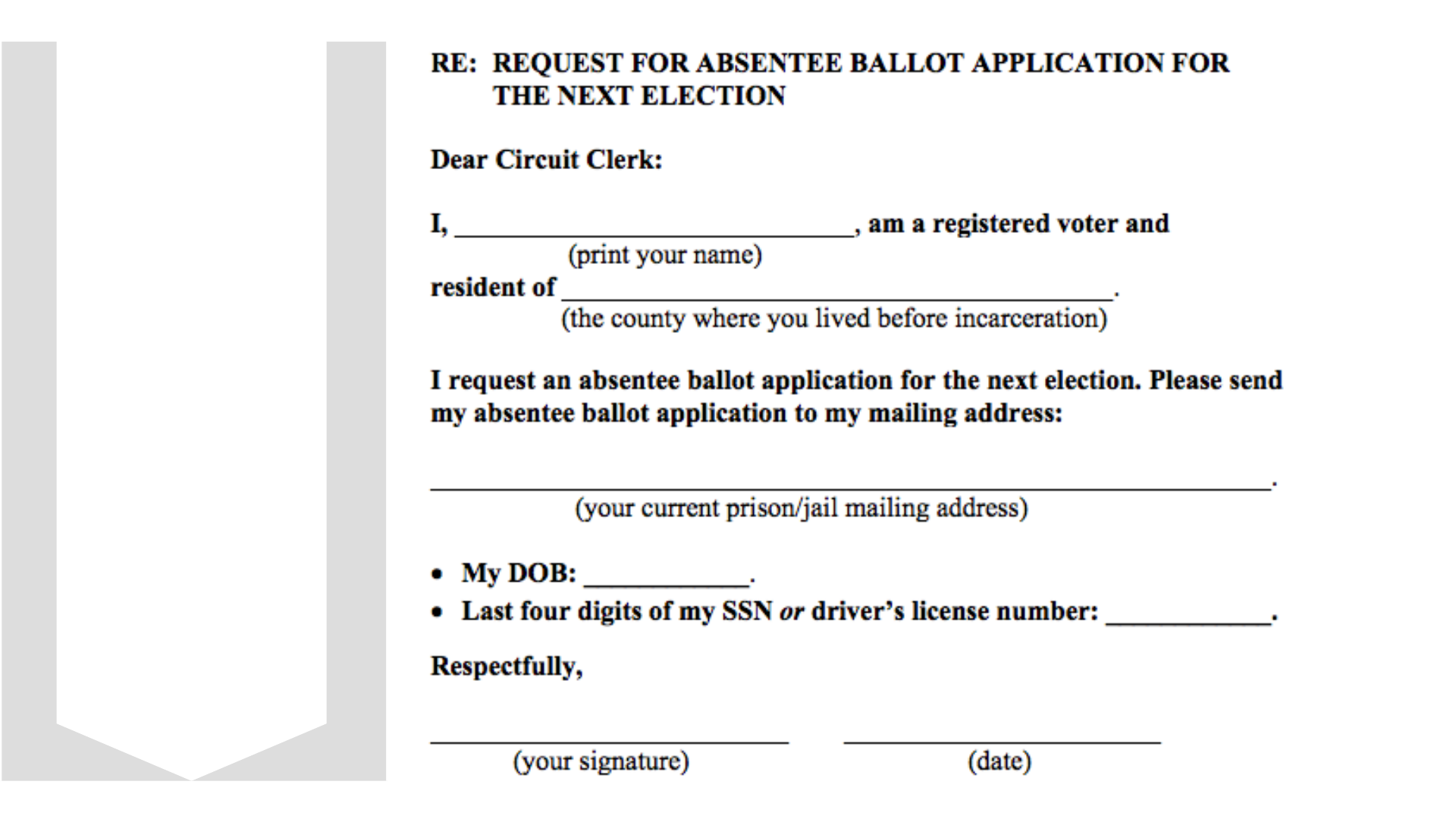
f
FILL- IN- THE BLANK
LETTER FOR
STEP 3:
REQUEST AN
ABSENTEE
BALLOT
APPLICATION
(YOU CAN FILL IN,
TEAR OUT, AND MAIL
TO YOUR COUNTY
CIRCUIT CLERK)
9/29/20A Guide to Voting in Mississippi When in Prison (v21) Rev.2 11

Return it ASAP after
receiving it. These
become available to be
mailed to you
45 days
before an election
.
(That’s after Sept. 21
for the 11/3/2020
election.)
ABSENTEE BALLOT APPLICATION
1. Complete the absentee ballot application that your Circuit Clerk mailed you.
2. Your Excuse For Voting Absentee
• We’ve been asking for official guidance from the Secretary of State (800-829-6786) on
this question. We may have learned more since printing. We can be reached at 601-
709-2139 (M/W/F, 2-6 pm).
• As of printing, to the best of our understanding, we read relevant case law to support
that incarcerated and detained people should check the excuse “I have a temporary or
permanent physical disability” and (to be safe) write in “incarcerated” by that excuse.
• You DO NOT NEED this notarized or signed by an official if you use this excuse.
• You DO need any person who is at least 18 years old to sign as a witness.
3. Sign it..
4. Write “voting mail” on the envelope and mail it to your Circuit Clerk.
STEP 4:
ABSENTEE
BALLOT
APPLICATION
Make a note of the
date you mailed it out.
When in Jail/Prison, Use These As Locations On All Voting Materials:
Your County Circuit Clerk
Your “residence” = where you lived prior to incarceration
Your “physical address” (not prison/jail)
Your “mailing address”
Your return mailing = your current jail/prison
address
9/29/20A Guide to Voting in Mississippi When in Prison (v21) Rev.2 12

It must be
postmarked by
election day and received
by five business days after
the election
.
(That’s
posted by Nov. 3 &
received by Nov. 10 for the
11/3/2020 election.)
VOTE BY ABSENTEE BALLOT!!
1. Complete the ballot your Circuit Clerk mailed you.
2. If asked for your excuse for voting absentee, refer to the previous slide (STEP 4: The
Absentee Ballot Application). If you check the excuse “I have a temporary or
permanent physical disability” and (to be safe) write in “incarcerated” by that
excuse, you do not need a notary.
3. You sign it. Seal the envelope.
4. Complete and sign the voter’s affidavit across the envelope’s sealed flap and have it
witnessed and signed by any person who is at least 18 years old.
5. Write “
confidential ballot/voting mail
” on the envelope. Mail it to your Circuit Clerk.
STEP 5:
ABSENTEE
BALLOT
Make a note of the date
you mailed it out.
CONGRATULATIONS!!
If you’re eligible and haven’t moved,
next time you can begin at Step 3: Starting
60 days pre-election, write your Circuit Clerk
for an absentee ballot application….
9/29/20A Guide to Voting in Mississippi When in Prison (v21) Rev.2 13
When in Jail/Prison, Use These As Locations On All Voting Materials:
Your County Circuit Clerk
Your “residence” = where you lived prior to incarceration
Your “physical address” (not prison/jail)
Your “mailing address”
Your return mailing = your current jail/prison
address

RESOURCES
STEP 6:
RESOURCES &
ATTACHMENTS
If you have questions about voting in prison or jail:
1. Ask someone you trust to visit www.yallvote.sos.ms.gov and look up the answer.
2. Your or someone you trust can call your County Circuit Clerk to ask for you. See
Attachment C
for a list of their phone numbers.
3. We can be reached at 601-709-2139 (M/W/F, 2-6 pm).
ATTACHMENTS IN THIS GUIDE
1. Attachment A
: Detailed list of disenfranchising crimes in order of criminal code section number
2. Attachment B
: Sample voter registration application
3. Attachment C
: Circuit Clerk Offices and Contact Info
4. Attachment D
: Selected Sources
5. Attachment E
: Blank Voter Registration Guide (if eligible, you can fill this out and mail it)
9/29/20A Guide to Voting in Mississippi When in Prison (v21) Rev.2 14

Attachment A
Detail list of Mississippi’s 22 Disenfranchising Crimes
(These are listed in order of code section; see Slide 6 for
the same list in order of offense name.)
9/29/20A Guide to Voting in Mississippi When in Prison (v21) Rev.2 15
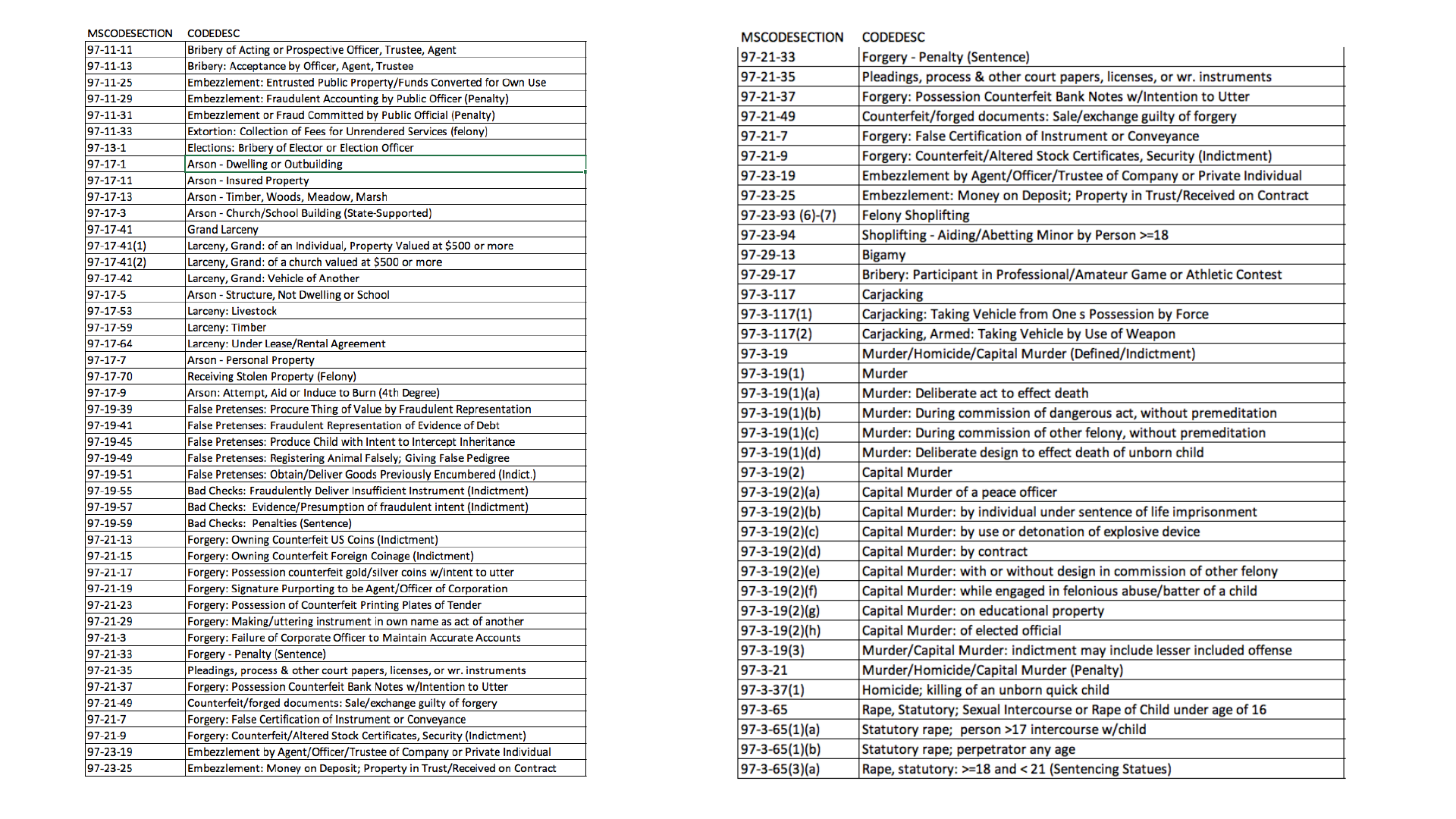
9/29/20A Guide to Voting in Mississippi When in Prison (v21) Rev.2 16
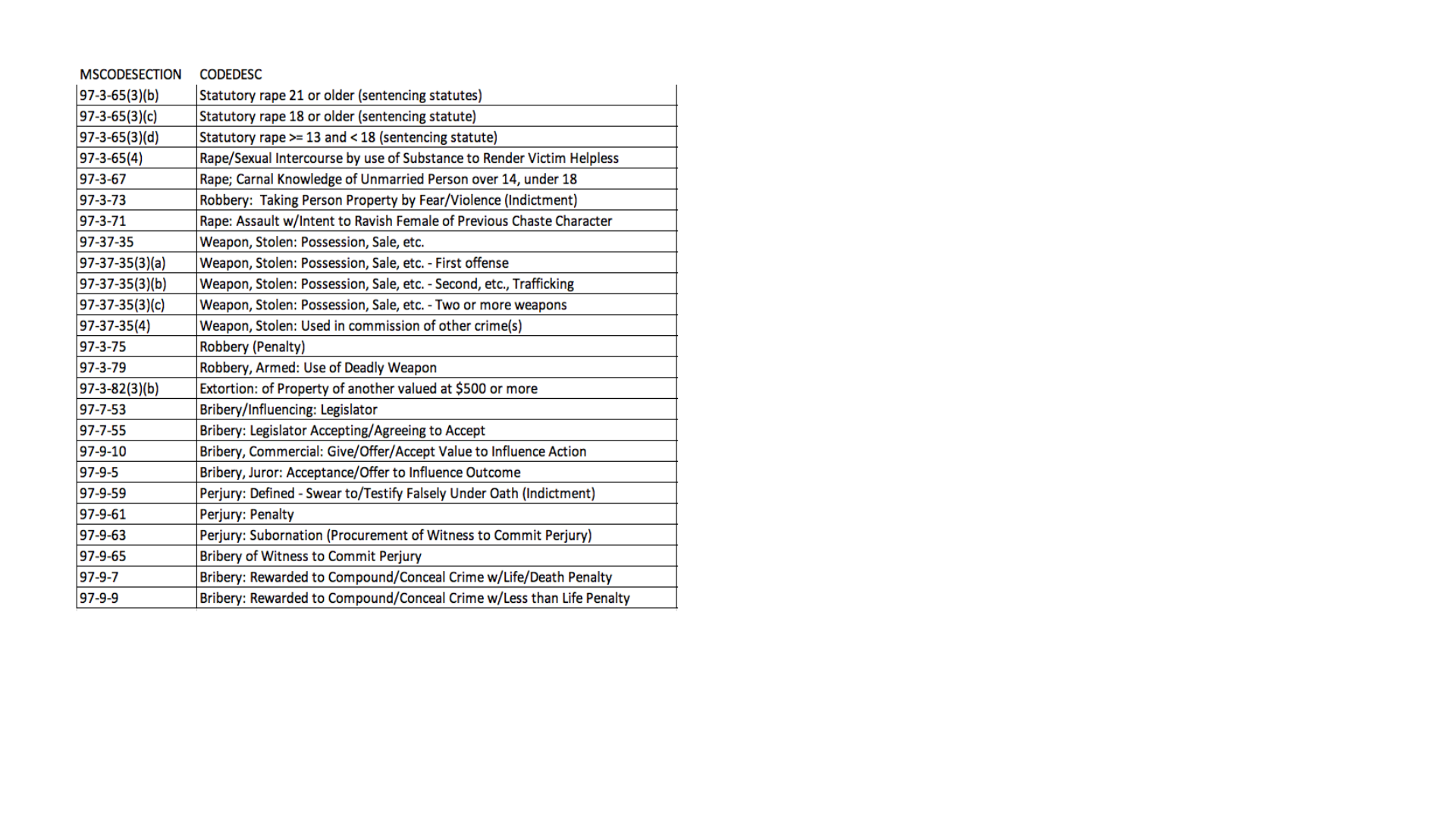
9/29/20A Guide to Voting in Mississippi When in Prison (v21) Rev.2 17

Attachment B
Sample voter registration application
9/29/20A Guide to Voting in Mississippi When in Prison (v21) Rev.2 18
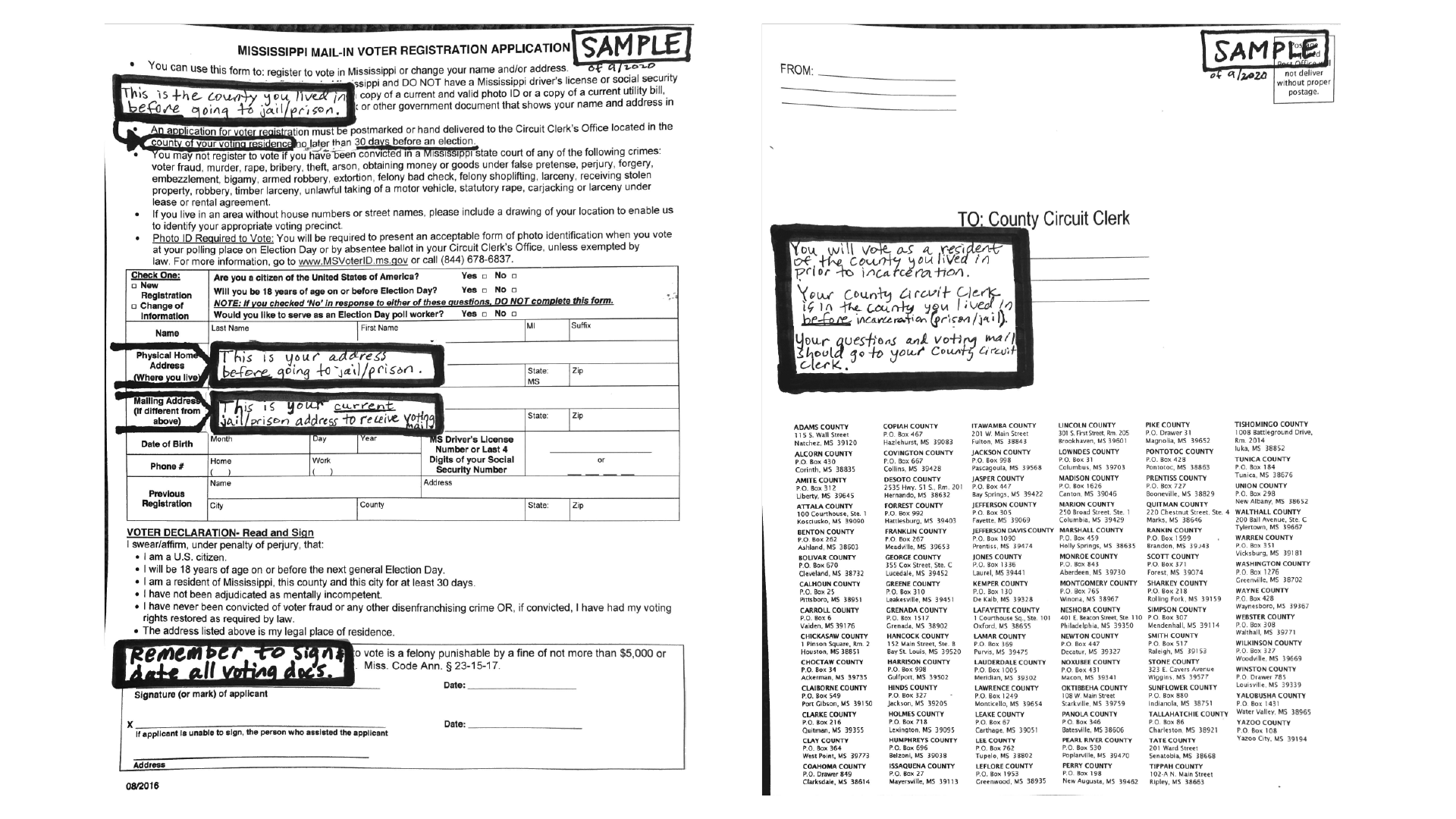
9/29/20A Guide to Voting in Mississippi When in Prison (v21) Rev.2 19

Attachment C
County Circuit Clerks and Contact Information
9/29/20A Guide to Voting in Mississippi When in Prison (v21) Rev.2 20
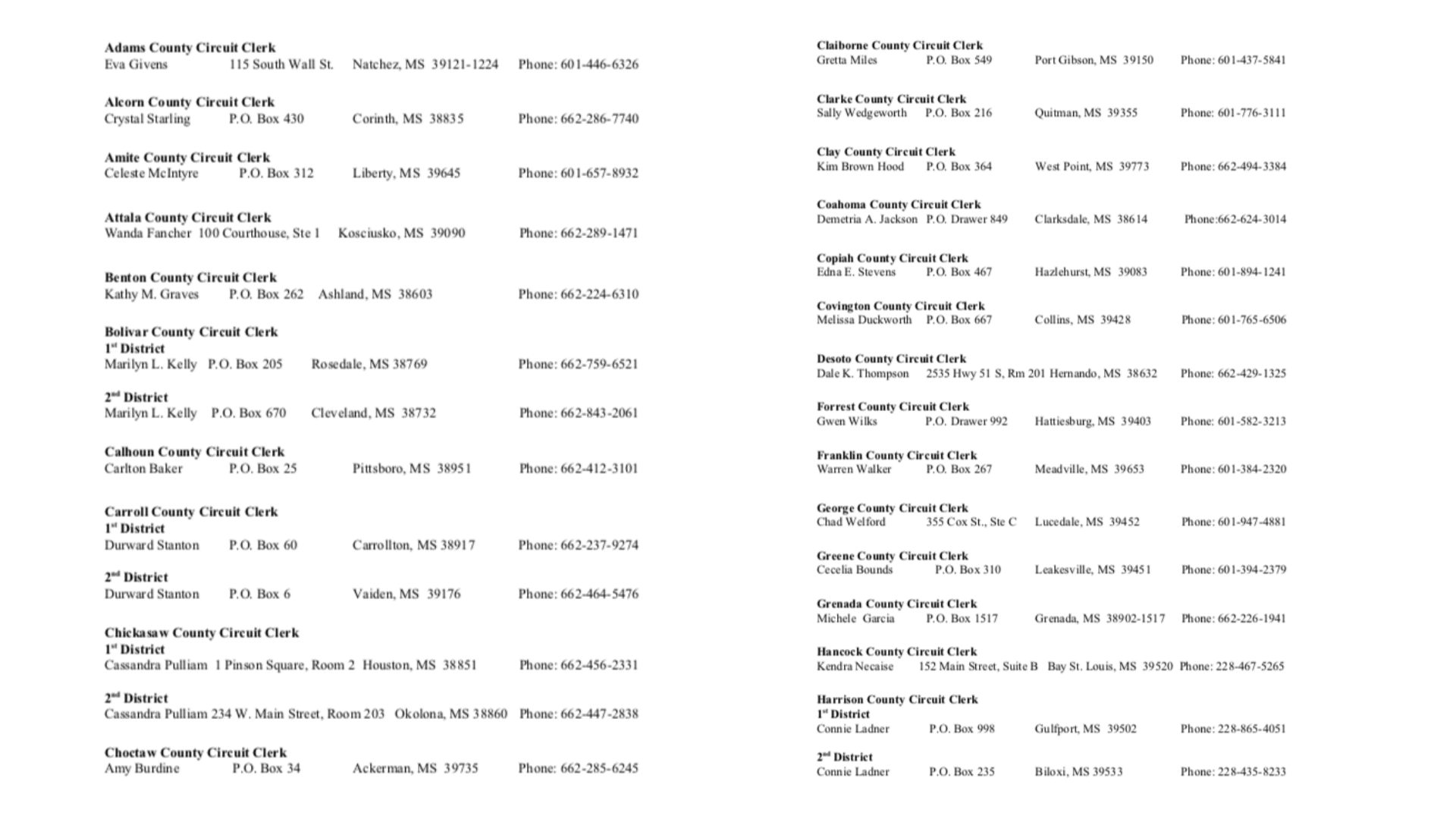
9/29/20A Guide to Voting in Mississippi When in Prison (v21) Rev.2 21
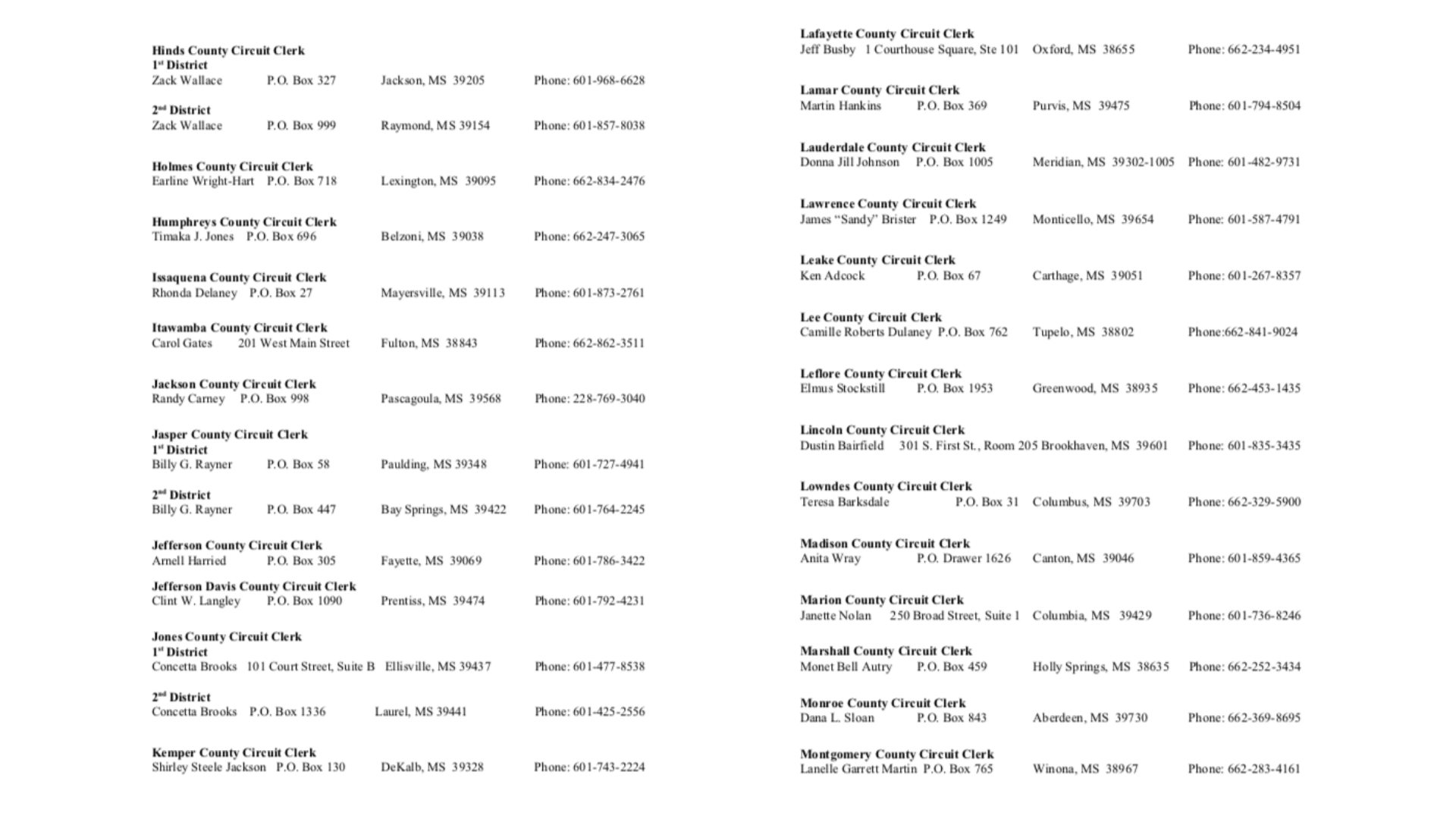
9/29/20A Guide to Voting in Mississippi When in Prison (v21) Rev.2 22
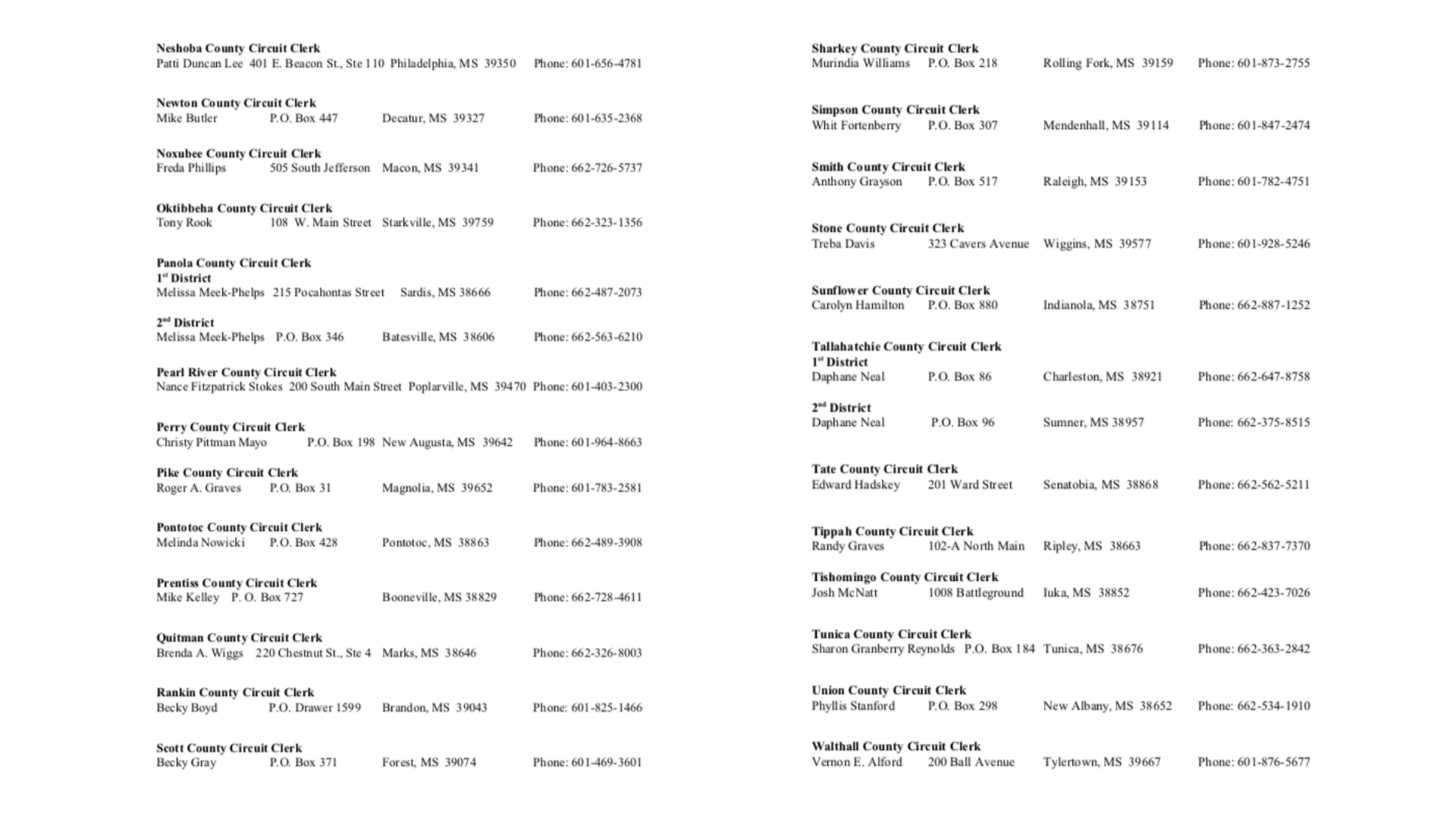
9/29/20A Guide to Voting in Mississippi When in Prison (v21) Rev.2 23

9/29/20A Guide to Voting in Mississippi When in Prison (v21) Rev.2 24

Attachment D
Selected Sources
9/29/20A Guide to Voting in Mississippi When in Prison (v21) Rev.2 25

The opinions of the authors of this guide are based on the authority discussed below. However, defer to the Secretary of State’s advice, excerpts of which are on Slides 27-28.
Denying qualified electors in jail their right to vote violates the Equal Protection Clause of the Fourteenth Amendment to the United States Constitution. O’Brien v. Skinner, 414
U.S. 524 (1974); see also Goosby v. Osser, 409 U.S. 512 (1973).
Detained voters must vote in the county where they lived prior to being incarcerated. Inmate Population in County Redistricting, Op. Att’y Gen. Miss. No. 2002-0060 (2002), 2002
WL 321998 (Miss. A.G.).
Eligible persons in jail and prison must be able to vote by absentee ballot. Murphree v. Wint er, 589 F. Supp. 374 (S.D. Miss. 1984) (permanently enjoining Mississippi from denying
a class of all eligible present and future pretrial detainees and prisoners from voting by absentee ballot.). Citing the U.S. Supreme Court’s decision in O’Brien, the district court in
Murphree construed Mississippi’s absentee voter law, then codified in Section 23-9-601 of the Mississippi Code, to “literally include[] pretrial detainees under the provision made
for those who are ‘physically unable’ to go to the polls and vote in person.” Id. at 381. Although Mississippi’s absentee ballot statute has undergone changes since the Murphree
decision, the rationale behind Murphree and O’Brien applies with full force to the existing statute, codified in Section 23-15-627 of the Mississippi Code.
Under Murphree, registered voters detained in Mississippi prisons or jails are eligible to vote an absentee ballot using the excuse that applies to voters with a “temporary
or permanent physical disability,” which is one of only thirteen excuses to vote by absentee ballot exist under current law (Section 23-15-627).
Voters who qualify for an absentee ballot due to having a “temporary or permanent physical disability” are exempted from the legal requirement to have one’s absentee ballot
application and absentee ballot witnessed by their county’s registrar, a notary public, or other officer having authority to administer an oath, (where the attesting witness may be
any person over the age of eighteen). Miss. Code Ann. § 23-15-631 (2013).
Eligible voters casting an absentee ballot by mail do not have to provide a photo ID to vote. See, e.g., Secretary of State, “When Do I Need A Photo ID?,” available at
https://www.msvoterid.ms.gov/Pages/Forms/When%20do%20I%20need%20an%20ID.pdf (last accessed 9/2020); Secretary of State, “Voter ID FAQ ,” available at
https://www.msvoterid.ms.gov/forms/FAQ%20Voter%20ID.pdf (last accessed 9/2020).
Mississippians are not qualified to vote if they have been disenfranchised due to conviction of one of the 22 disenfranchising felonies. These are vote fraud or any crime listed in
Section 241 of the Mississippi Constitution of 1890 as interpreted by the Attorney General; in sum, these are: vote fraud, armed robbery, arson, bigamy, bribery, carjacking,
embezzlement, extortion, felony bad check, felony shoplifting, forgery, larceny, murder, obtaining money or goods under false pretense, perjury, rape, receiving stolen property,
robbery, statutory rape, theft, timber larceny, and unlawful taking of a vehicle. See 2009 WL 2517257, at *1 (Miss. A.G. July 9, 2009). All 22 disenfranchising offenses are listed on
Mississippi’s voter registration application.
This means that most felonies in Mississippi are not disenfranchising, including illegal drug possession and intent to sell drugs (Miss. AG Opinion No. 2000-0473, 2000 WL 1511821
(Aug. 25, 2000)); burglary (Miss. AG Opinion No. 2000-0454, 2000 WL 1511843 (Aug. 18, 2000)); assault and aggravated assault (Miss. AG Opinion No. 2009-00077, 2009 WL
927963 (Mar. 6, 2009)); manslaughter (Miss. AG Opinion, 1980 WL 28849 (Jul. 7, 1980)).
9/29/20A Guide to Voting in Mississippi When in Prison (v21) Rev.2 26
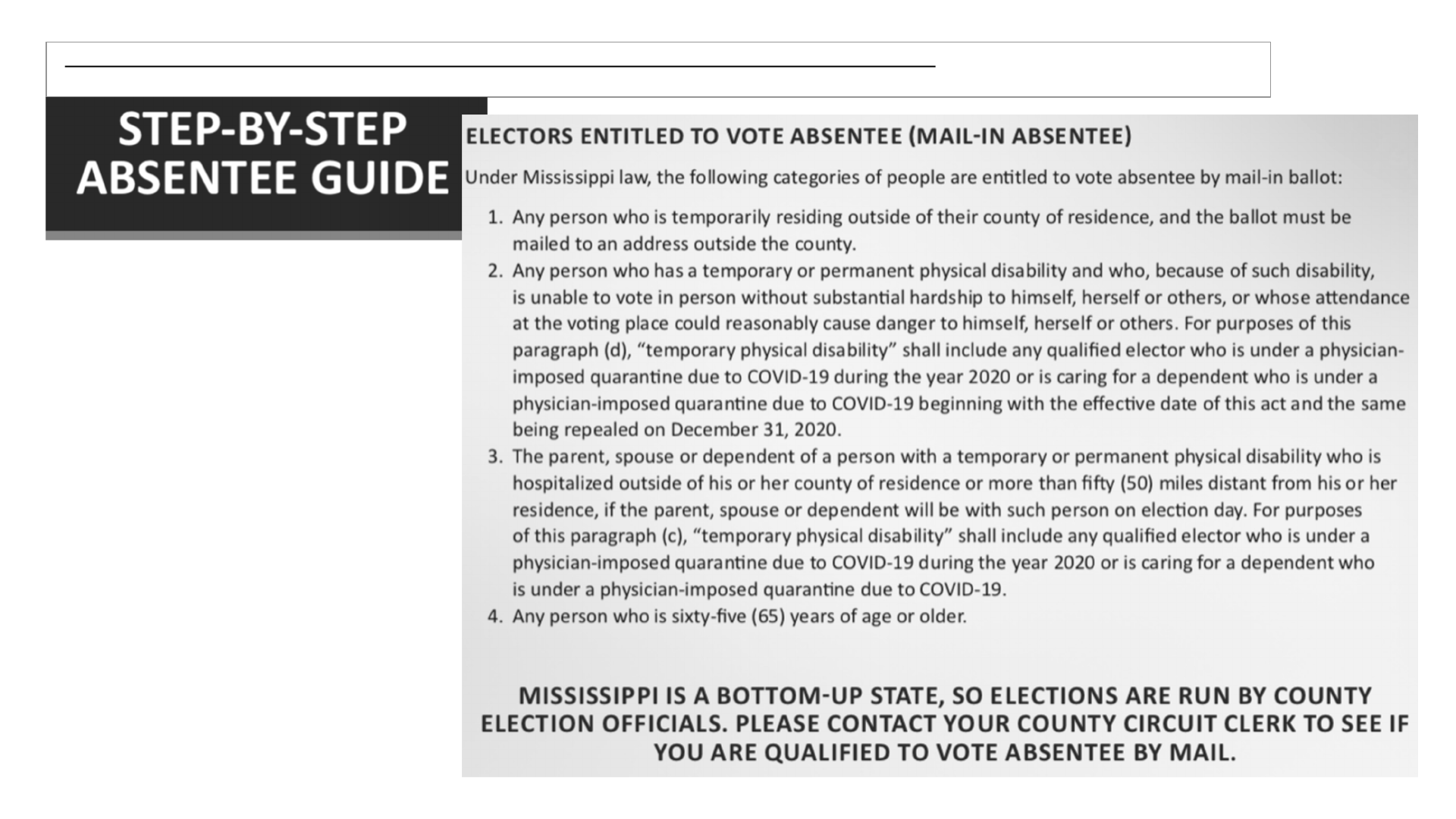
Selected Excerpts from Mississippi Secretary of State Michael Watson’s ”Step-by-Step Absentee Guide,” available at
https://www.sos.ms.gov/content/documents/elections/Step-by-Step%20Guide%20to%20Absentee%20Voting_forweb.pdf (last visited 9/2020).
9/29/20A Guide to Voting in Mississippi When in Prison (v21) Rev.2 27
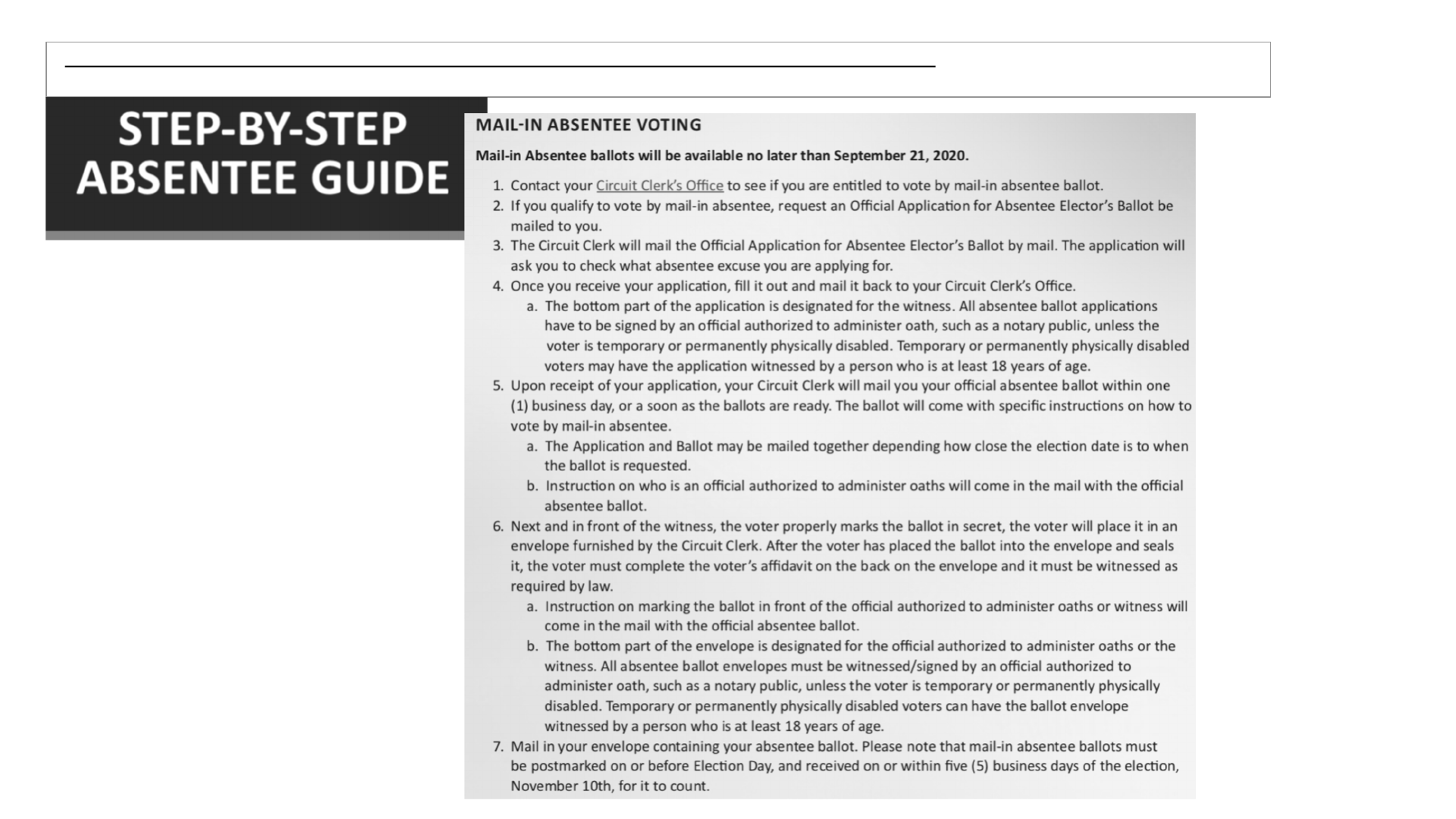
Selected Excerpts from Mississippi Secretary of State Michael Watson’s ”Step-by-Step Absentee Guide,” available at
https://www.sos.ms.gov/content/documents/elections/Step-by-Step%20Guide%20to%20Absentee%20Voting_forweb.pdf (last visited 9/2020).
9/29/20A Guide to Voting in Mississippi When in Prison (v21) Rev.2 28

Attachment E
Blank Voter Registration Form
(If you are eligible, you can fill out and mail this form.)
9/29/20A Guide to Voting in Mississippi When in Prison (v21) Rev.2 29
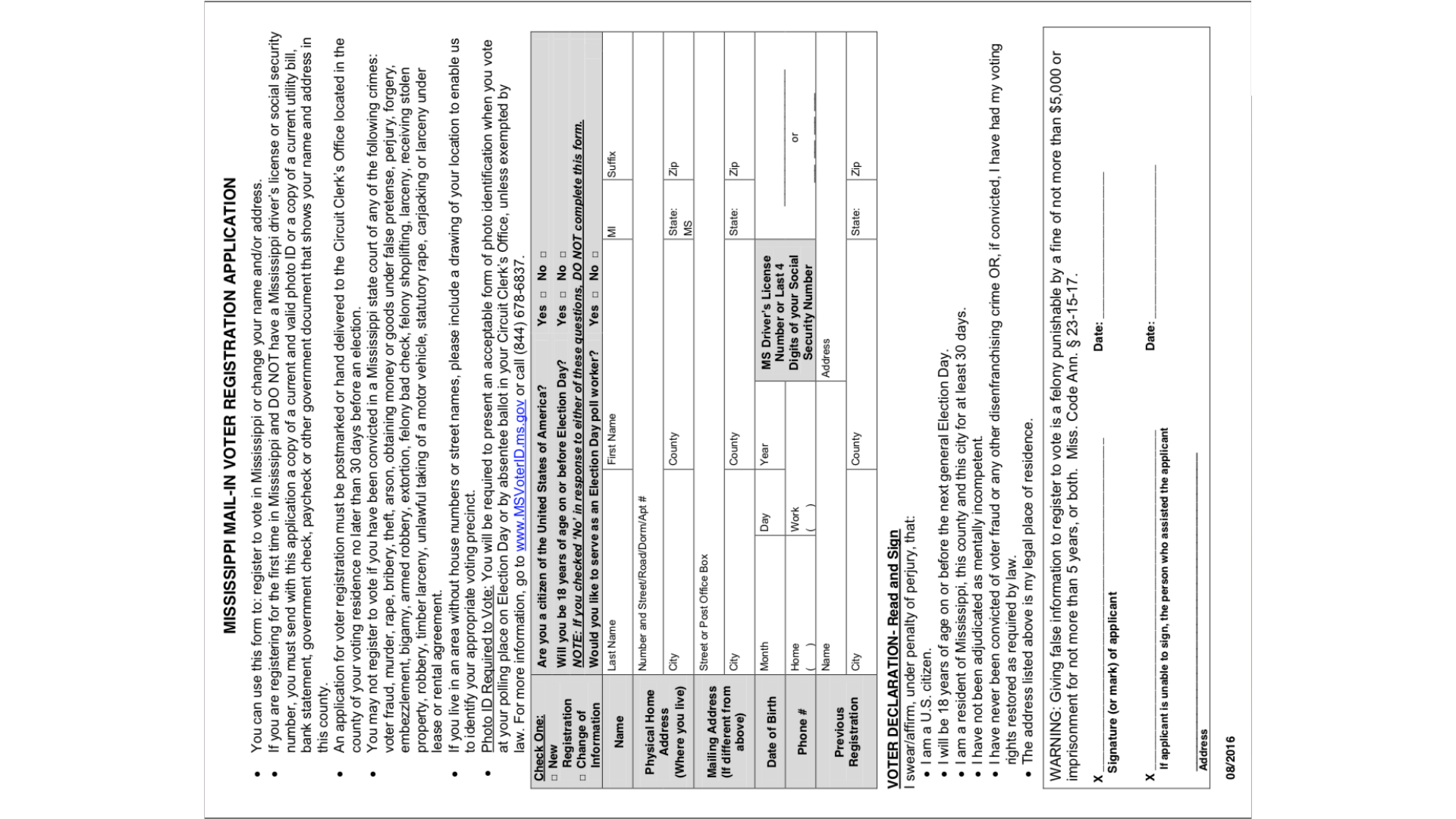
30
9/29/20
A Guide to Voting in Mississippi When in Prison (v21) Rev.2
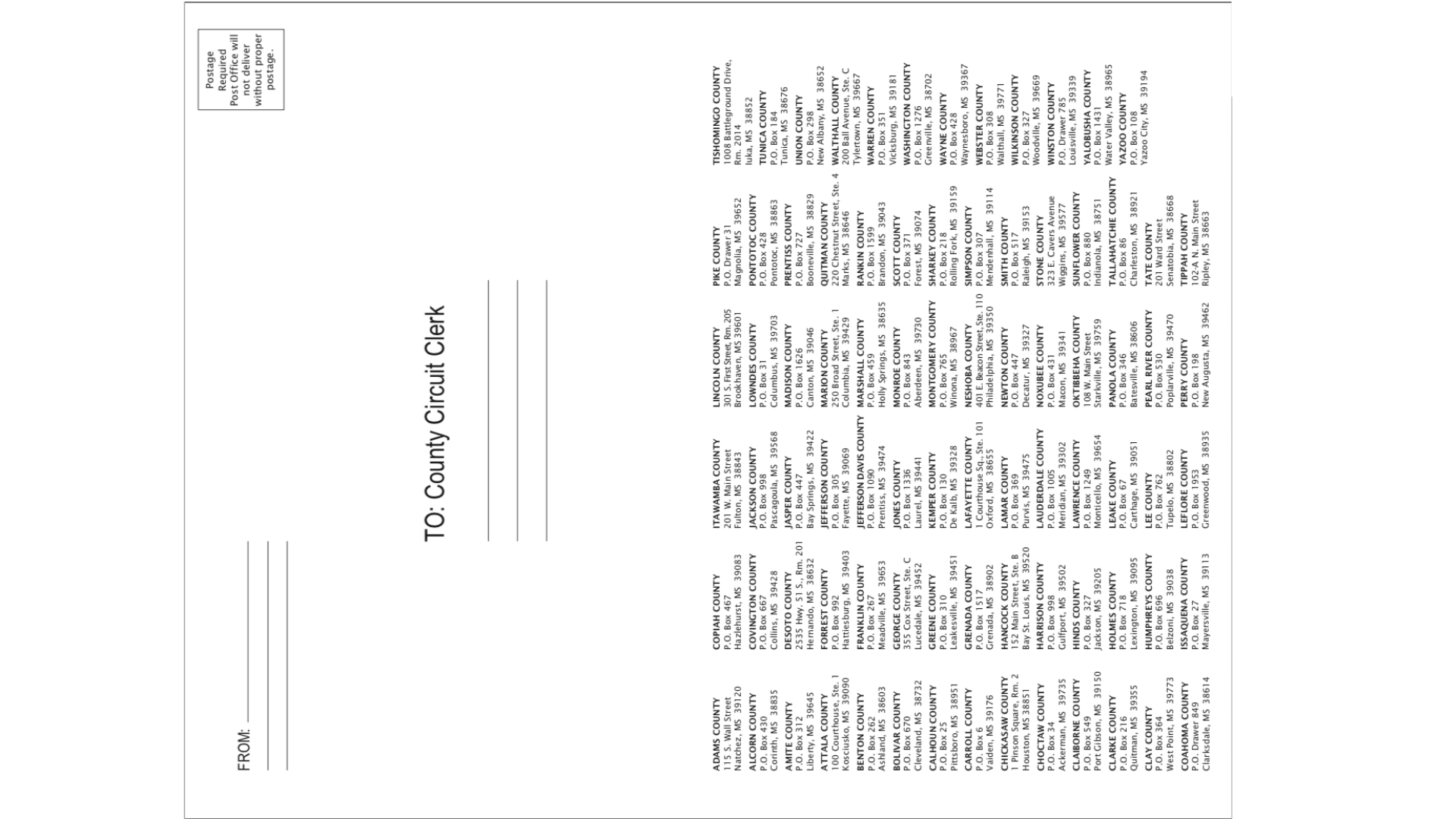
9/29/20
31
A Guide to Voting in Mississippi When in Prison (v21) Rev.2
